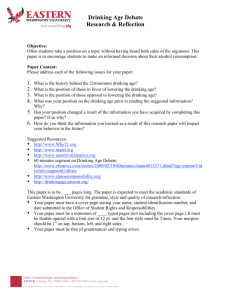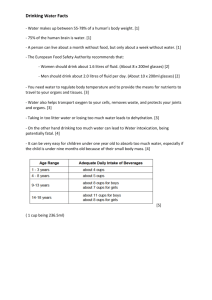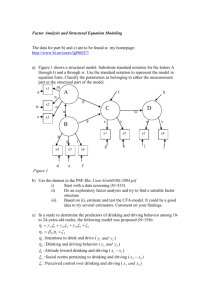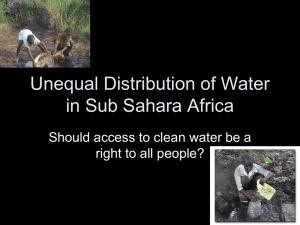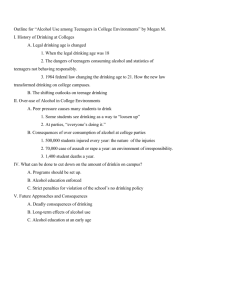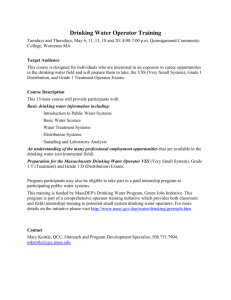Costanza 1 Amanda Costanza Professor Packer English 1010
advertisement
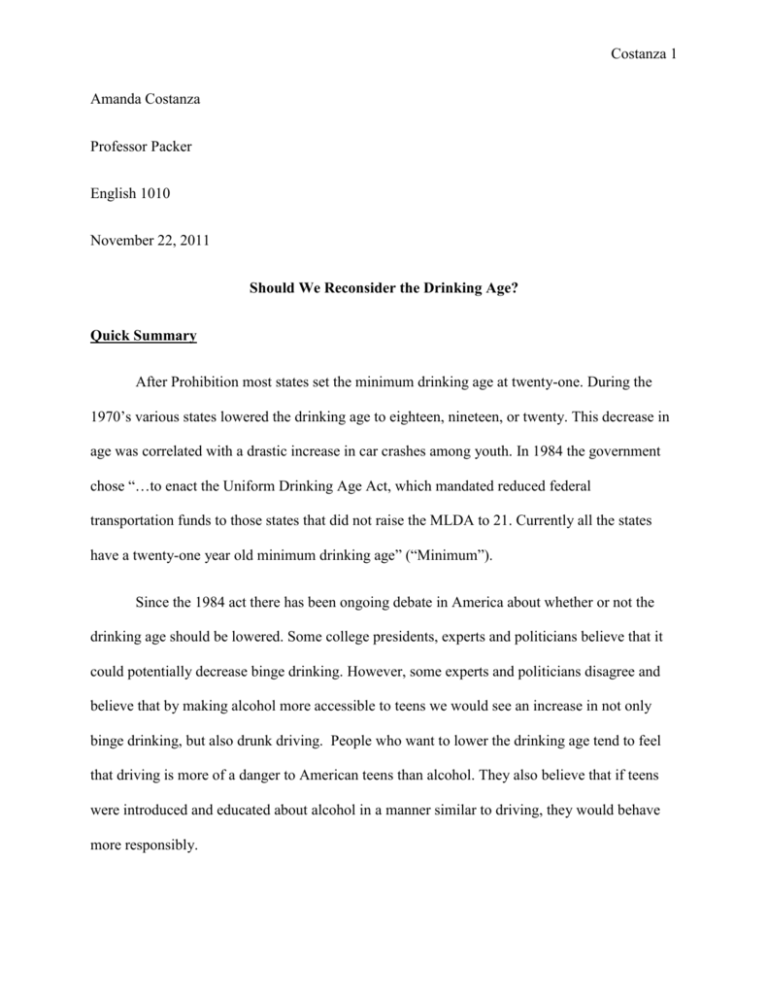
Costanza 1 Amanda Costanza Professor Packer English 1010 November 22, 2011 Should We Reconsider the Drinking Age? Quick Summary After Prohibition most states set the minimum drinking age at twenty-one. During the 1970’s various states lowered the drinking age to eighteen, nineteen, or twenty. This decrease in age was correlated with a drastic increase in car crashes among youth. In 1984 the government chose “…to enact the Uniform Drinking Age Act, which mandated reduced federal transportation funds to those states that did not raise the MLDA to 21. Currently all the states have a twenty-one year old minimum drinking age” (“Minimum”). Since the 1984 act there has been ongoing debate in America about whether or not the drinking age should be lowered. Some college presidents, experts and politicians believe that it could potentially decrease binge drinking. However, some experts and politicians disagree and believe that by making alcohol more accessible to teens we would see an increase in not only binge drinking, but also drunk driving. People who want to lower the drinking age tend to feel that driving is more of a danger to American teens than alcohol. They also believe that if teens were introduced and educated about alcohol in a manner similar to driving, they would behave more responsibly. Costanza 2 College President’s Perspective College presidents have been alarmed by the recent increase in binge drinking on college campuses. The Amethyst Initiative was created by over 130 college presidents that wanted to encourage discussions over the drinking age. They suggest that lowering the drinking age could decrease dangerous binge drinking (Wechsler, Nelson). They feel that most of the dangers of binge drinking occur with teens desiring to drink but being obligated to hide their actions. They often rush drinks during “pre-gaming” so that they can have a buzz before they go somewhere else where they cannot drink alcohol. The college presidents feel that “The principal problem...is not drunken driving [it] is clandestine binge drinking” (McCardell Jr.). Teens often drink in abandoned places and afraid of the repercussions, hide it from their parents. Instead of being able to call them for a ride, they drive after drinking to avoid getting caught; this decision can be fatal (McCardell Jr.). Choose Responsibility is a non-profit started by John McCardell president of Middlebury College. Along with The Amethyst Initiative, they suggest lowering the drinking age to eighteen and requiring teens to complete educational courses on alcohol and the related risks. After teens completed the course and passed the exams they would receive permits or licenses allowing them to drink but with certain restrictions (Main). They also strongly urge a transition in how Americans view alcohol. They suggest introducing teens to alcohol within a safe family based environment to teach them more responsible drinking habits (Main). An article from the New York Times’ Room for Debate discusses the idea behind this concept. Some of the people argued that if teens are first introduced to alcohol right after they leave home -- in crowded party settings -- they will be less Costanza 3 wise in their decisions (“Teenage”).“What would you rather have? Kids experiencing the effects of alcohol with the guidance of their parents, or … with their peers shouting “chug, chug, chug” at them” (“Teenage”)? Often times this party setting with peer pressure, causes kids to overdrink and put themselves in danger, in an effort to fit in. Another point that the college presidents focus on is the discrepancy between the legal drinking age of twenty one and the legal age of adulthood being eighteen (McCardell Jr.). It hardly seems logical that an eighteen year old could not drink champagne on their wedding day or have a beer with their fellow soldiers who fought with them in Iraq (Buell). College presidents feel that the drinking age of twenty one has proved to be ineffective for our current times. They realize that safer roads and cars, as well as increased awareness of the dangers of alcohol, have made drunken driving deaths less prominent. They think we should adjust our tactics for the new problem of binge drinking. They believe if we lowered the drinking age, educated teens on responsibility, and required an appropriate alcohol education course it may lower the shocking numbers of binge drinkers in all age groups (McCardell Jr.). Expert’s Perspective Some experts are doubtful of college president’s claims that a lower drinking age could decrease binge drinking. They worry that a minimum drinking age of eighteen could encourage youth to drink irresponsibly and increase drinking related deaths (Moyse and Fonder). However, there are also some experts that agree with the arguments of the college presidents. These experts tend to feel that rather than increasing regulations on alcohol we should focus our efforts on changing how society views alcohol consumption (Buell). Costanza 4 The experts that are happy with the current minimum age argue that college presidents are neglecting their “responsibility” with enforcing the drinking laws. They conclude that college presidents would prefer to lower the minimum age rather than enforce the law on their campuses (Moyse and Fonder). They point out that according to the Department of Transportation the current drinking age has saved about one thousand lives each year. This is not a number to be taken lightly. They find it difficult to comprehend the incentive for lowering the drinking age and risking the lives of not only teens and drivers but also pedestrians (Moyse and Fonder). On the other hand Dr. David Hanson, one of the proponents of the lower minimum drinking age, feels that despite our best attempts to combat underage drinking it is still prominent and quite dangerous due to its illicit nature (Ogilvie). John Buell, a journalist for Bangor Daily News who has researched the drinking age, feels that eighteen year olds face many dangers and that alcohol should not be considered so much more dangerous than the rest. He finds it unfair that an eighteen year old is considered an adult and is allowed to vote, be married, join the army and in some cases smoke, but never to drink. He feels that this inherently makes the current drinking law a form of “hypocrisy” (Buell). These experts suggest two steps that should be connected with a lower drinking age. The first is the drinking education course that Choose Responsibility and the college presidents are proponents of. The argument is that through better education and permits with restriction that would be determined through studies and research, people would drink more responsibly (Buell). John Buell said that, “The legal drinking age seems to be less important than the culture and practices surrounding alcohol.” This is what the second step focuses on. It encourages us to Costanza 5 create a safe, family based atmosphere to encourage responsible drinking habits before youth leave home (Buell). Both views from the experts seem to realize that there is no simple solution to the drinking age issue. Those satisfied with the current drinking age cannot help but feel that it would be a shame to risk the lives of so many people by making alcohol more accessible, while the experts, who feel we should lower the drinking age, believe that the current age has been ineffective and we should carefully consider other options. Politician’s Perspective Politicians have varying opinions on the drinking age. Some feel that is has been very effective and saved countless lives (Moyse and Fonder). Others worry that it is forcing underage drinking into places that cannot be properly monitored. However, one of the biggest problems that makes discussion of the drinking age nearly impossible is the fear of losing highway funding (Curran). Politicians that agree with the current drinking age have one main argument. The number of alcohol related deaths has declined dramatically. These lives saved each year are important and there is no reason we should consider lowering the minimum drinking age and risking the likelihood of so many deaths (Moyse and Fonder). In Vermont, Senator Hinda Miller argues that rather than “…preventing underage drinking [we are] simply putting it outside the public eye.” This results in alcohol related deaths of another sort, with ill-fated decisions to drive under the influence in misguided attempts to avoid discovery (Curran). Costanza 6 Although politicians have varying opinions, neither side can be certain of what is best. However, some senators are left wondering if a law made twenty years ago and which has caused so much debate is worth reconsidering, at least to confirm that it is still the best method of alcohol regulation (Curran). Conclusion Should we reconsider the drinking age? It is clear that there is no easy answer or solution to this question. While many people support the current drinking age and feel that statistics prove that it is effective, not everyone is convinced. Proponents for a lower drinking age seem to realize that it may not be the perfect solution, however they hope that discussion over the issue can at least be encouraged and thoroughly considered. Meanwhile, proponents of the current drinking age understand that the rise in binge drinking is a problem, but are hesitant to risk more lives by lowering the drinking age. Whatever your stance on the issue may be, it is clear that we must readjust our tactics in some way to attack the new problem of binge drinking. Costanza 7 Works Cited Buell, John. “It Is Healthy for Teens to Drink Moderately in the Home.” Teen Drug Abuse (2011). Opposing Viewpoints Resource Center. Web. 12 Nov.2011 Curran, John. "Vermont Latest to Eye Lower Drinking Age." Rutland Herald (Rutland, VT). Feb. 29 2008: n.p. SIRS Issues Researcher. Web. 16 Nov 2011. Main, Carla T. "Underage Drinking and the Drinking Age." Policy Review (2009): 33-46. SIRS Researcher. Web. 14 Nov. 2011. McCardell Jr., John M. “The Drinking Age Should Be Lowered.” Teen Drug Abuse (2011). Opposing Viewpoints Resource Center. Web. 12 Nov. 2011 "Minimum Legal Drinking Age." American Medical Association - Physicians, Medical Students & Patients (AMA)(n.d). American Medical Association. Web. 16 Nov. 2011. Moyse, Misty, and Melanie Fonder. "The Drinking Age Should Not Be Lowered." Teen Drug Abuse (2011). Opposing Viewpoints Resource Center. Web. 14 Nov. 2011. Ogilvie, Jessica Pauline. "Pro/Con: Should Legal Drinking Age Be Lowered to 18?." Los Angeles Times. 30 May 2011: E.1. SIRS Issues Researcher. Web. 16 Nov 2011. "Teenage Drinking Diaries." Web log post. Room For Debate. Ed. The Editors. The New York Times, 25 June 2010. Web. 14 Nov. 2011. Wechsler, Henry, and Toben F. Nelson. "Will Increasing Alcohol Availability by Lowering the Minimum Legal Drinking Age Decrease Drinking and Related Consequences Among Costanza 8 Youths?" American Journal of Public Health 100.6 (2010): 986-92. SIRS Researcher. Web. 07 Nov. 2011.


